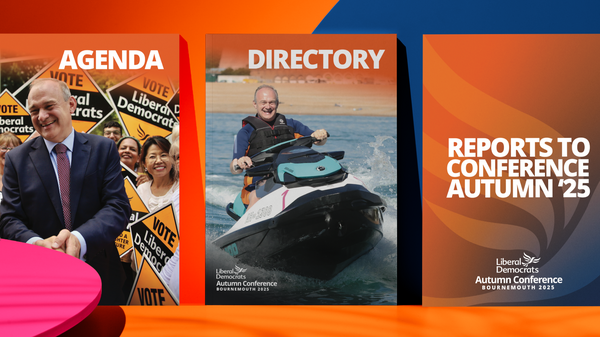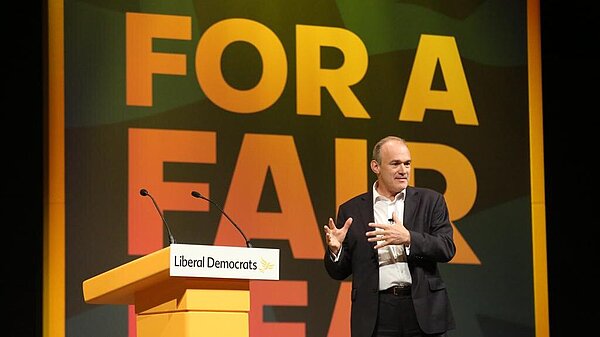Freedom from Harm: Gambling as a Public Health Issue
F9 - Policy Motion
Chair: Paul McGarry; Aide: Lord Mohammed; Hall Aide: Cllr Darryl Smalley
Motion as passed by conference
- As many as 2.5% of the adult British population suffer from problem gambling and a further 11.5% see lower levels of harm or elevated risk.
- Children can also experience gambling harms, with an estimated up to 1.5% of 11 to 17–year–olds affected.
- With an estimated one gambling–related suicide a day, gambling is now determined to be one of six key risk factors for suicide in the National Suicide Prevention Strategy.
- For each individual with a gambling problem, many others are harmed by family breakdown, crime, loss of employment, loss of homes and ultimately, loss of life.
- Up to 3.6 million adults are negatively impacted by someone else’s gambling and there are 1.7 million children growing up in households where an adult is experiencing gambling problems.
- The Department of Health estimates that gambling costs the Government and society between £1.05 billion and £1.77 billion a year.
- The Government has explicitly said it wishes to see the gambling sector grow, which runs counter to a public health approach to gambling.
- While gamblers from ethnic minority backgrounds are less likely to gamble than their white counterparts, data from GambleAware shows that they are twice as likely to suffer harm from their gambling (42% of gamblers from ethnic minority backgrounds suffered harm compared to 20% of their white British counterparts in 2023).
Conference further notes:
- The 2023 Gambling White Paper acknowledged the need for a public health approach and proposed reforms to licensing powers for local authorities, including reviewing the “aim to permit” obligation and enabling better consideration of public health and community impacts; however, these recommendations have not yet been implemented.
- Analysis by the Social Market Foundation shows that doubling the rate of Remote Gaming Duty, charged on online gambling profits, would raise between £575 million and £900 million a year, depending on the preventative effect of the higher rate.
- Research shows gambling advertising and marketing leads people to start gambling, those who are gambling to gamble more and those who have stopped gambling to start again.
- The World Health Organisation and the three leading public health institutions in the UK – RSPH, ADPH, and FPH – recommend ending gambling advertising. Many countries have already done so or have severely restricted it.
- There is significant public support for measures to curtail gambling advertising and marketing.
- Self–regulation of gambling advertising codes has failed to protect the public.
- Essential affordability checks and data sharing between operators remain undelivered, meaning proper safeguarding cannot take place.
- No substantive progress has been made to deliver a Gambling Ombudsman, as set out in the 2023 Gambling White Paper to be established and operational within 12 months.
- Local authorities face significant constraints when seeking to challenge the opening of new gambling venues due to outdated licensing frameworks.
- There has been no attempt to effectively regulate ‘loot boxes’, despite their similarity to gambling and their links to harm and continued failings by the game industry to uphold self– regulatory principles.
- Local authorities frequently find that attempts to restrict new gambling premises (especially in areas affected by gambling harm) are overturned by the courts, due to the narrow objectives of Labour’s Gambling Act 2005 and the statutory ‘aim to permit’ principle. Councils are unable to consider cumulative impact or public health evidence in licensing decisions, placing communities at risk and undermining local democracy.
Conference welcomes:
- The introduction of a statutory levy on all gambling operators to help fund research, prevention and treatment of gambling harm.
- The introduction of measures to bring stakes and prizes for online gambling more in line with those for land–based gambling.
Conference calls on the UK Government to:
- Enact population–wide public health policies, putting the promotion of the public’s health at the centre of all gambling regulation.
- Create a statutory, independent Gambling Ombudsman with real power to protect consumers and resolve complaints.
- Ensure robust regulation of the gambling industry and gambling products, including by strengthening the independence of the regulator and by ensuring that the primary objective of the regulator is to protect the public.
- Take action to curb the impact of gambling advertising, marketing, and sponsorship, including by ending inducements, direct marketing and gambling marketing and sponsorship at sports events; and by ending pre–watershed gambling advertising.
- Introduce clear and enforceable restrictions on content marketing, particularly on social media.
- Replace the current self-regulation of gambling advertising with independent and enforceable regulation.
- Review whether further measures to restrict gambling advertising are necessary.
- Enforce affordability checks by mandating financial checks and data sharing to stop gambling beyond means.
- Reform the licensing framework by:
- Regulate ‘loot boxes’ as gambling, with strict age limits and full regulation.
- Increase remote gaming duty from 21% to 42%.
- Ringfence monies from the gambling industry duties to fund greater research to reduce gambling harms for ethnic minorities.
- Removing the statutory presumption in favour of permitting gambling applications under the Gambling Act 2005.
- Giving local authorities the same powers to refuse gambling venues as they have over pubs and other licenced premises.
- Enabling local authorities to introduce cumulative impact policies to prevent clustering and saturation of gambling premises in vulnerable areas.
- Ensuring that local public health bodies can make statutory representations and that public health evidence is given full weight in licensing decisions.
- Implementing the relevant commitments from the 2023 Gambling White Paper to strengthen local authority discretion and better reflect community harm.
Applicability: Federal except 9. (lines 85–86), which are England only.
Motion Prior to Amendment
Submitted by: 12 party members
Mover: Lord Foster of Bath.
Summation: Max Wilkinson MP (Spokesperson for Culture, Media and Sport).
- As many as 2.5% of the adult British population suffer from problem gambling and a further 11.5% see lower levels of harm or elevated risk.
- Children can also experience gambling harms, with an estimated up to 1.5% of 11 to 17–year–olds affected.
- With an estimated one gambling–related suicide a day, gambling is now determined to be one of six key risk factors for suicide in the National Suicide Prevention Strategy.
- For each individual with a gambling problem, many others are harmed by family breakdown, crime, loss of employment, loss of homes and ultimately, loss of life.
- Up to 3.6 million adults are negatively impacted by someone else’s gambling and there are 1.7 million children growing up in households where an adult is experiencing gambling problems.
- The Department of Health estimates that gambling costs the Government and society between £1.05 billion and £1.77 billion a year.
- The Government has explicitly said it wishes to see the gambling sector grow, which runs counter to a public health approach to gambling.
Conference further notes:
- The 2023 Gambling White Paper acknowledged the need for a public health approach and made several welcome recommendations to reduce gambling harm, but many have not been implemented.
- Analysis by the Social Market Foundation shows that doubling the rate of Remote Gaming Duty, charged on online gambling profits, would raise between £575 million and £900 million a year, depending on the preventative effect of the higher rate.
- Research shows gambling advertising and marketing leads people to start gambling, those who are gambling to gamble more and those who have stopped gambling to start again.
- The World Health Organisation and the three leading public health institutions in the UK – RSPH, ADPH, and FPH – recommend ending gambling advertising. Many countries have already done so or have severely restricted it.
- There is significant public support for measures to curtail gambling advertising and marketing.
- Self–regulation of gambling advertising codes has failed to protect the public.
- Essential affordability checks and data sharing between operators remain undelivered, meaning proper safeguarding cannot take place.
- No substantive progress has been made to deliver a Gambling Ombudsman, as set out in the 2023 Gambling White Paper to be established and operational within 12 months.
- Local authorities face significant constraints when seeking to challenge the opening of new gambling venues due to outdated licensing frameworks
- There has been no attempt to effectively regulate ‘loot boxes’, despite their similarity to gambling and their links to harm and continued failings by the game industry to uphold self– regulatory principles
Conference welcomes:
- The introduction of a statutory levy on all gambling operators to help fund research, prevention and treatment of gambling harm.
- The introduction of measures to bring stakes and prizes for online gambling more in line with those for land–based gambling.
Conference calls on the UK Government to:
- Enact population–wide public health policies, putting the promotion of the public’s health at the centre of all gambling regulation.
- Create a statutory, independent Gambling Ombudsman with real power to protect consumers and resolve complaints.
- Ensure robust regulation of the gambling industry and gambling products, including by strengthening the independence of the regulator and by ensuring that the primary objective of the regulator is to protect the public.
- Take action to curb the impact of gambling advertising, marketing, and sponsorship, including by ending inducements, direct marketing and gambling marketing and sponsorship at sports events; and by ending pre–watershed gambling advertising.
- Introduce clear and enforceable restrictions on content marketing, particularly on social media.
- Replace the current self-regulation of gambling advertising with independent and enforceable regulation.
- Review whether further measures to restrict gambling advertising are necessary.
- Enforce affordability checks by mandating financial checks and data sharing to stop gambling beyond means.
- Level the playing field on licensing by giving local councils the same powers over gambling venues as they have over pubs.
- Regulate ‘loot boxes’ as gambling, with strict age limits and full regulation.
- Increase remote gaming duty from 21% to 42%.
Applicability: Federal except 9. (lines 85–86), which are England only.
Amendments
Drafting Amendments
The FCC has agreed to make the following drafting amendments to the motion:
After G. (line 21), insert:
H. While gamblers from ethnic minority backgrounds are less likely to gamble than their white counterparts, data from GambleAware shows that they are twice as likely to suffer harm from their gambling (42% of gamblers from ethnic minority backgrounds suffered harm compared to 20% of their white British counterparts in 2023).
After 11. (line 89), insert:
12. Ringfence monies from the gambling industry duties to fund greater research to reduce gambling harms for ethnic minorities.
Amendment One
PASSED
Submitted by: 19 members
Mover: Cllr Nick da Costa
Summation: Cllr Chris Wiggin
Delete i) (lines 23-26), and insert:
i) The 2023 Gambling White Paper acknowledged the need for a public health approach and proposed reforms to licensing powers for local authorities, including reviewing the “aim to permit” obligation and enabling better consideration of public health and community impacts; however, these recommendations have not yet been implemented.
After x) (line 54), insert:
xi) Local authorities frequently find that attempts to restrict new gambling premises (especially in areas affected by gambling harm) are overturned by the courts, due to the narrow objectives of Labour’s Gambling Act 2005 and the statutory ‘aim to permit’ principle. Councils are unable to consider cumulative impact or public health evidence in licensing decisions, placing communities at risk and undermining local democracy.
Delete 9. (lines 85-86), and insert:
9. Reform the licensing framework by:
- Removing the statutory presumption in favour of permitting gambling applications under the Gambling Act 2005.
- Giving local authorities the same powers to refuse gambling venues as they have over pubs and other licenced premises.
- Enabling local authorities to introduce cumulative impact policies to prevent clustering and saturation of gambling premises in vulnerable areas.
- Ensuring that local public health bodies can make statutory representations and that public health evidence is given full weight in licensing decisions.
- Implementing the relevant commitments from the 2023 Gambling White Paper to strengthen local authority discretion and better reflect community harm.


